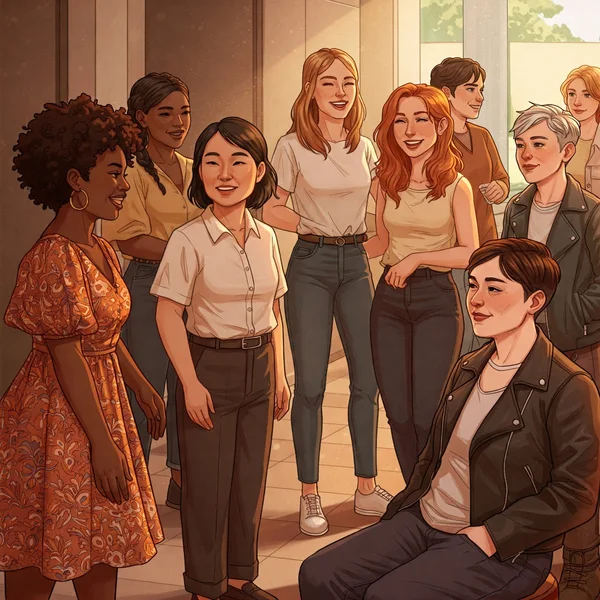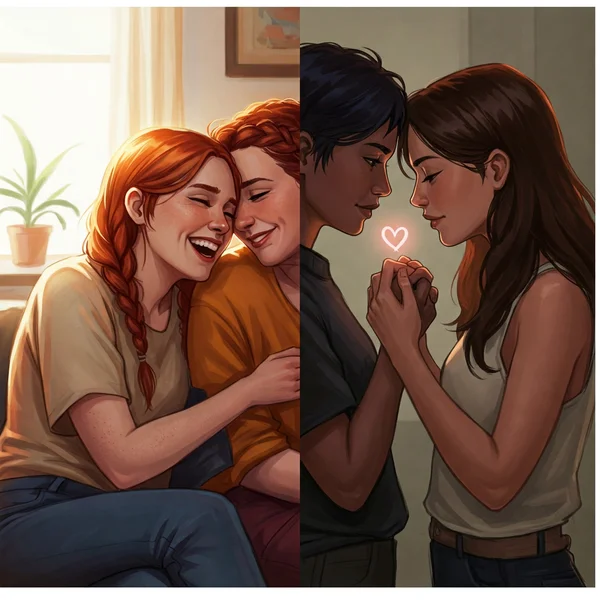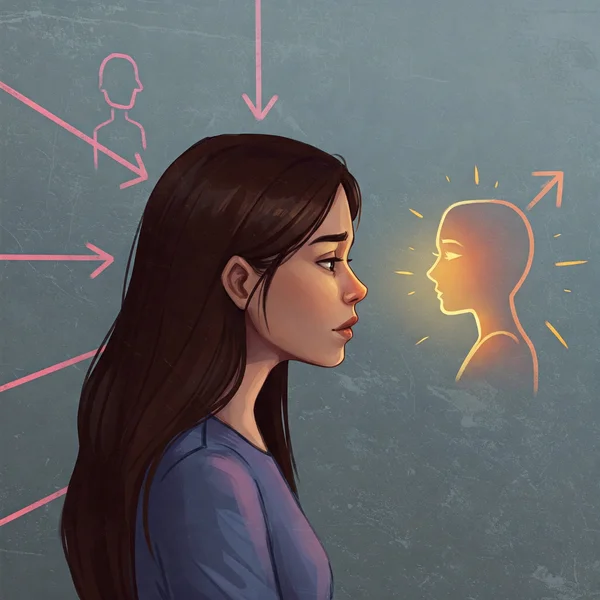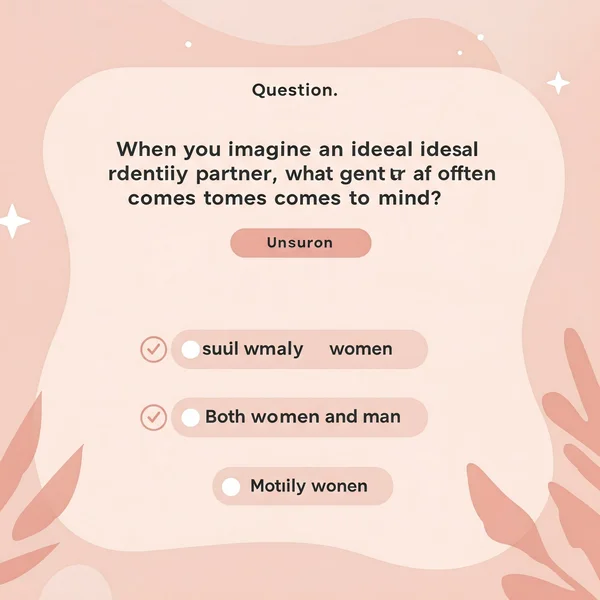Am I Lesbian? Guide to Same-Sex Attraction for Women
May 10, 2025 | By Isla Dawson
Understanding and Exploring Feelings for Other Women
Navigating feelings of attraction can be complex, especially when those feelings are directed towards other women and you're trying to understand your own female sexuality. If you've found yourself asking, "Am I lesbian?" or wondering how do I know if I like girls?, you're not alone. Exploring same-sex attraction for women is a personal journey, and it's okay to have questions. This guide is designed to offer support, clarity, and insights as you explore these feelings, and introduce how resources like the tools at GayQuiz.org can be part of your exploring identity process.
What Does Identifying as Lesbian Mean?
So, what does it actually mean to identify as lesbian? Simply put, a lesbian is typically understood as a woman who experiences romantic, emotional, or sexual attraction primarily or exclusively to other women. However, this definition is just a starting point for understanding lesbian identity.
Beyond Stereotypes: The Diversity of Lesbian Experiences
It's crucial to move beyond harmful stereotypes. There's no single "look" or way to be a lesbian. LGBTQ women are incredibly diverse in their expressions, interests, and life experiences. Understanding this diversity is key to appreciating the richness within the lesbian community and rejecting limiting assumptions about female sexuality.

Understanding the Spectrum of Female Sexuality
Female sexuality exists on a spectrum. Identifying as lesbian is one point on that spectrum, but attractions can be fluid for some, and identities can intersect in many ways (like being bisexual or pansexual). Recognizing this spectrum helps create a more inclusive understanding of attraction between women.
Recognizing Same-Sex Attraction: Common Signs for Women
If you're questioning sexuality, figuring out the nature of your feelings towards other women can be confusing. What are signs you might like girls? Here are some common areas of same-sex attraction women might experience:
Emotional Connection vs Romantic Feelings
Deep emotional connection with female friends is common and valuable. However, sometimes these intense bonds might blur into romantic feelings. Ask yourself: Does the connection feel different? Is there a longing for partnership, exclusivity, or a deeper romantic intimacy beyond typical friendship? Distinguishing these requires honest self-reflection.

Physical Attraction and Desire Towards Women
Do you experience physical attraction towards women? This could range from appreciating someone's appearance to feeling a specific desire for physical closeness, touch, or intimacy. Recognizing these feelings is a significant part of understanding same-sex attraction for women.
Daydreams, Fantasies, and Imagining a Future
Pay attention to your inner world. Do your fantasies or daydreams often involve romantic or intimate scenarios with women? Do you imagine a future partnership with a woman? These internal cues can be powerful indicators when exploring identity.
Navigating Societal Expectations and Internal Feelings
Understanding same-sex attraction for women often involves navigating both external pressures and complex internal feelings. How do societal expectations play a role? Society often assumes heterosexuality as the default, which can make recognizing and accepting different attractions challenging.
Understanding Compulsory Heterosexuality
Compulsory heterosexuality, or comphet, is the societal pressure and assumption that everyone is or should be heterosexual. This can lead women to dismiss or misunderstand their feelings for other women, sometimes attributing them to intense friendship or admiration. Recognizing comphet can be validating during identity exploration.

Dealing with Internalized Homophobia or Biphobia
Growing up in a society that doesn't always affirm LGBTQ women can lead to internalized homophobia or biphobia – negative feelings or beliefs about same-sex attraction turned inward. Acknowledging these internal feelings, if present, is a step towards self-acceptance.
Finding Supportive Voices and LGBTQ+ Women Role Models
Connecting with supportive voices – whether friends, family, or online communities – is vital. Seeing positive LGBTQ+ women role models living authentic lives can also be incredibly empowering and normalizing during your questioning sexuality phase. Seeking out these connections can make a huge difference.
Exploring Your Feelings: How an "Am I Lesbian Quiz" Can Help
While self-reflection is key, sometimes structured tools can aid the process. Is it okay to take an "Am I Lesbian Quiz"? Absolutely. Tools like the quizzes available for sexuality exploration can serve as helpful prompts.
What a Focused Lesbian Test Might Explore
A thoughtful lesbian test or quiz (even our general one adapted for this context) might ask questions designed to help you consider the points mentioned above: the nature of your emotional connections, physical attractions, fantasies, and how you feel about different relationship dynamics involving women. It encourages focused thought on same-sex attraction women.

Using Quiz Insights for Self-Reflection
Remember, the goal of taking a lesbian quiz isn't to get a definitive definition of who you are. It’s about gaining insights for self-reflection. Use the results as a springboard: What questions resonated? What feelings came up? How does this align with your lived experience? Our online quiz tool is built for this kind of exploration.
Your Journey, Your Pace: Embracing Self-Discovery
Exploring identity related to female sexuality is your journey. There's no right timeline or single "correct" outcome. Be patient and kind to yourself throughout this process of self-discovery. Embracing uncertainty is part of figuring things out.
Understanding whether you identify as lesbian is a deeply personal exploration into same-sex attraction for women. It involves listening to your heart, examining your feelings for other women, and challenging both societal norms and internal barriers. Tools like an "Am I Lesbian Quiz" can be supportive starting points for reflection, but ultimately, you are the expert on your own experience. Embrace your journey of self-discovery with courage and self-compassion. Are you ready to explore further? Consider taking our sexuality quiz as a step in understanding your feelings. What has your experience exploring these questions been like? Share your thoughts (anonymously, of course) in the comments below if you feel comfortable.
Answering Questions About Exploring Lesbian Identity
Here are some frequently asked questions specific to women exploring their lesbian identity:
-
How do I know if I genuinely like girls or if it's just a phase?
Feelings can evolve, but consistent romantic or sexual attraction to women over time, especially if it feels more authentic than attraction to men, suggests it's likely more than a phase. True self-reflection is key, rather than seeking external validation alone. Sometimes, an "Am I Lesbian Quiz" can help structure that reflection.
-
Can I be lesbian if I've dated men before?
Yes, absolutely. Your past relationships don't invalidate your current feelings or lesbian identity. Many lesbians have dated men before realizing or accepting their attraction to women. Your identity is based on your present understanding of yourself.
-
What's the difference between being lesbian and bisexual/pansexual?
Generally, 'lesbian' refers to women exclusively attracted to other women. 'Bisexual' typically means attraction to more than one gender (often men and women), and 'pansexual' means attraction regardless of gender identity. These labels can overlap, and self-identification is most important when exploring identity.
-
Is it okay to take an "Am I Lesbian Quiz" if I'm unsure?
Definitely. Quizzes like the one offered at GayQuiz.org are tools for exploration, especially useful when you're unsure or questioning sexuality. It’s a private way to engage with questions you might be hesitant to ask elsewhere.
-
Where can I find support groups or communities for LGBTQ+ women?
Look for local LGBTQ+ centers, university groups, online forums (like specific subreddits), social media groups dedicated to LGBTQ women, or organizations like PFLAG for family support. Finding community can be incredibly validating.